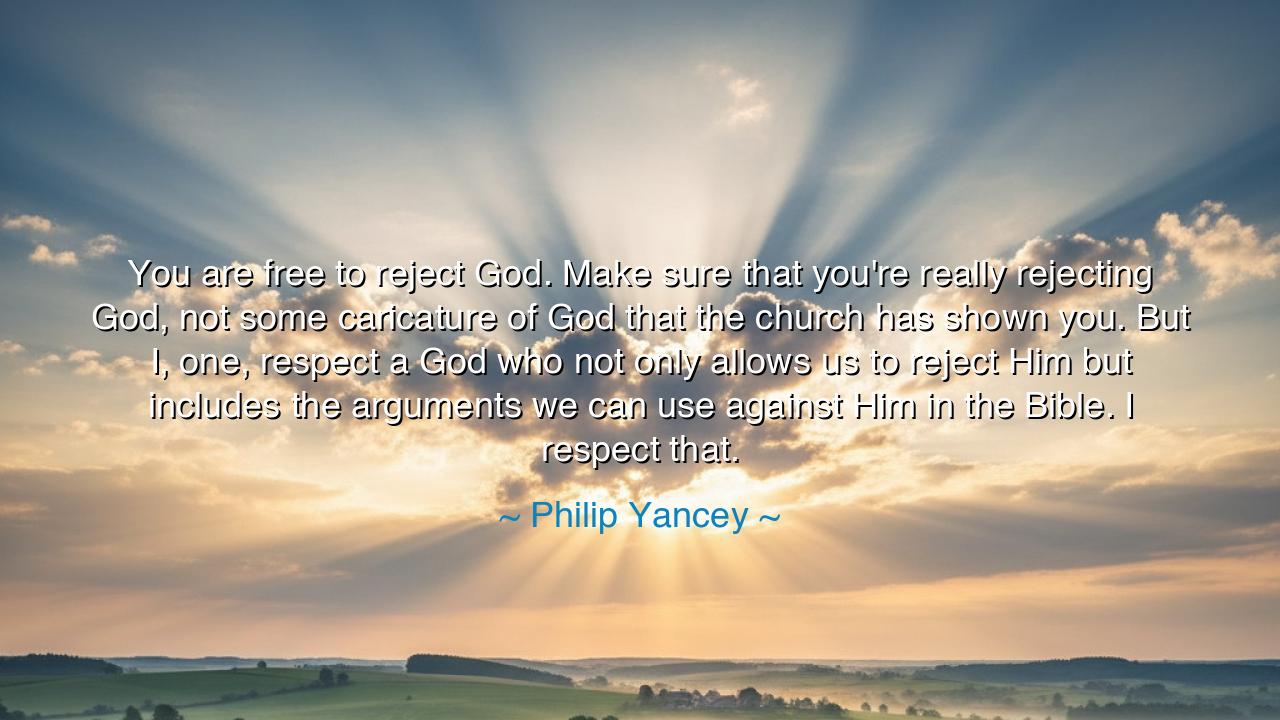
You are free to reject God. Make sure that you're really
You are free to reject God. Make sure that you're really rejecting God, not some caricature of God that the church has shown you. But I, one, respect a God who not only allows us to reject Him but includes the arguments we can use against Him in the Bible. I respect that.






“You are free to reject God. Make sure that you're really rejecting God, not some caricature of God that the church has shown you. But I, one, respect a God who not only allows us to reject Him but includes the arguments we can use against Him in the Bible. I respect that.” Thus spoke Philip Yancey, a seeker among believers, a pilgrim among doubters. His words carry the weight of paradox — that faith is not the absence of questioning, but the courage to question within faith. In this saying, Yancey does not speak as a preacher commanding belief, but as a humble witness to divine freedom. For he recognizes what the ancients, in their wisdom, knew well: that love which cannot be refused is not love at all.
The first truth Yancey offers is both liberating and terrifying — “You are free to reject God.” This freedom is the essence of human dignity. The Creator, if He is indeed love, must also grant His creation the right to say “no.” The ancient scriptures tell of Adam’s choice, of Israel’s rebellion, of Jonah fleeing the call — and yet, in every story, the divine presence remains, not as tyrant, but as teacher. Freedom is the soil in which both sin and salvation grow. To be free to reject God is also to be free to love Him — not as slave, but as child. In this, Yancey sees not weakness in the divine, but greatness: a God who risks rejection to preserve our will is a God of infinite humility.
Yet, Yancey’s warning pierces deeper: make sure that what you reject is truly God, and not a distortion. Through centuries of fear and misunderstanding, many have mistaken human corruption for divine character. Churches, built in the name of heaven, have at times reflected more of human pride than divine mercy. People have walked away not from the Eternal, but from a caricature — a cruel image painted by those who misunderstood His heart. This, Yancey pleads, must be discerned. For to reject the false god of hypocrisy is no sin; to reject the true God of compassion and truth is to turn from the very source of life itself.
There is a haunting nobility in Yancey’s next thought: he respects a God who allows His creatures to argue with Him. Indeed, the sacred texts are filled not with blind obedience, but with holy defiance. Abraham dares to question the justice of destroying Sodom. Job demands an answer for his suffering. The psalmists cry, “Why have You forsaken me?” Even Christ, in His final agony, echoes this lament. The Scriptures, as Yancey reminds us, do not hide these rebellions; they record them as sacred, as part of the dialogue between the finite and the infinite. What kind of God includes His own critique within His book? Only one who values relationship over control, truth over pretense, love over fear.
In this divine openness, there is profound respect for the human spirit. Philip Yancey, in the tradition of the prophets and poets, sees faith not as submission to silence, but as an honest conversation with the Almighty. The one who doubts, when honest, is closer to faith than the one who pretends certainty. For the doubter still wrestles with God, as Jacob wrestled the angel in the night — wounded, yet blessed. To question is not betrayal; it is engagement. The false faith of the rigid heart withers, but the living faith of the seeker endures. Thus, Yancey’s words stand as both shield and invitation: do not fear your questions, for God Himself welcomes them.
Consider the story of C.S. Lewis, who once rejected God with fierce intellect, scorning faith as illusion. Yet his rejection was not of the true God, but of a god he believed small and cruel. When he finally encountered the living truth of grace — a God both transcendent and tender — his disbelief transformed into devotion. In his writings, as in Yancey’s, we hear the same theme: the journey from falsehood to faith is not a leap, but a wrestling. And God, in His mercy, meets us even in our resistance.
So, my children, take this teaching to heart: you are free — utterly free — to question, to doubt, even to walk away. But let your rejection be honest. Do not turn from a distorted idol and think you have turned from the Divine. Seek truth, even through anger; speak your questions aloud, for silence is the true enemy of understanding. If you wrestle with God, wrestle faithfully — as one who knows that love remains even in struggle.
For in the end, the lesson of Philip Yancey’s wisdom is this: the greatness of God is shown not in His demand for obedience, but in His invitation to honesty. He is not threatened by our doubt; He is honored by our sincerity. Respect, then, this freedom, and use it well. Seek truth, question deeply, love fiercely — for the God who gave you mind and heart desires not your silence, but your soul.






AAdministratorAdministrator
Welcome, honored guests. Please leave a comment, we will respond soon